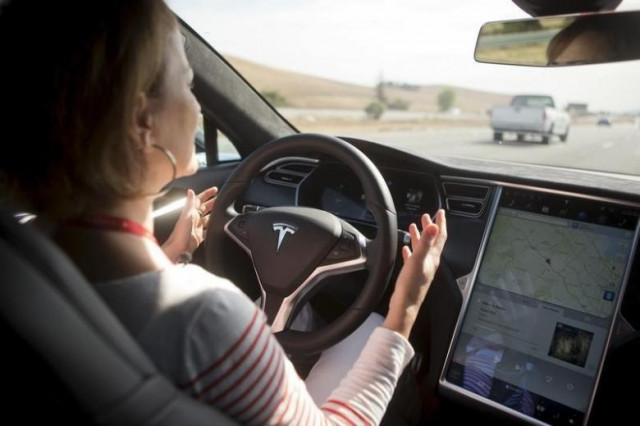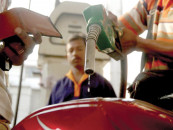Probe into fatal Tesla autopilot crash finds no ‘safety-related defect’
A Tesla driver was killed in June while using its “autopilot” self-driving mechanism on its Model S electric car

New autopilot features are demonstrated in a Tesla Model S during a Tesla event in Palo Alto, California. PHOTO: REUTERS
No "safety-related defect" was identified in May's crash on a Florida highway, National Highway Traffic Safety Administration spokesperson Bryan Thomas told reporters.
"The investigation is closed," he said.
The NHTSA also looked at dozens of other non-fatal crashes that happened when the Autopilot feature was in use in Teslas, including the Model S involved in the fatal crash, Thomas told reporters in a conference call.
Tesla driver killed in first fatal crash while using 'autopilot' mode
While no defect is apparent in the overall system or the Automatic Emergency Braking feature, and no further investigation is needed for now, "the closing of this investigation does not constitute a finding by NHTSA that no safety-related defect exists," he said.
"The agency will monitor the issue and reserves the right to take future action if warranted by the circumstances."
Tesla founder Elon Musk tweeted shortly after the NHTSA finding was announced, calling the final report "very positive."
Final report on Autopilot issued by @NHTSAgov is very positive https://t.co/KsOZSrr3l9
— Elon Musk (@elonmusk) January 19, 2017
Thomas said the investigation indicated the fatal Florida crash, in which a Tesla was hit by a truck crossing a highway, involved "a number of human factor issues," including use of the automatic system beyond its design.
Report highlight: “The data show that the Tesla vehicles crash rate dropped by almost 40 percent after Autosteer installation.”
— Elon Musk (@elonmusk) January 19, 2017
Those issues likely will have implications for how major automakers, including Mercedes and BMW, design the next generation of autonomous driving features, to limit driver misuse, including distracted driving, as much as possible.
And Thomas questioned the marketing of the technology as an "autopilot" feature, which could contribute to drivers overestimating the car's capability.
Tesla crash raises concerns over regulations
These features "require the continual and full attention of the driver" so that they are "prepared to take action to avoid crashes."
New technology "must be designed with the inattentive driver in mind" to ensure safety, he said. The agency "will aggressively oversee new technology" put on the road and continue to investigate during this rapid period of innovation.
The investigation found that in the fatal crash in Florida, the driver would have had seven seconds to react when the tractor trailer crossed the highway. The impact sheared off the top of the car, killing the driver.
That was enough time "to take some action" but it is impossible to know if he could have avoided the accident entirely, Thomas said.
The car was traveling at 74 miles (119 kilometers) per hour ahead of impact in an area where the posted speed limit was 65 miles per hour, NHTSA found.
Some reports said the driver may have been watching a DVD at the time, ignoring Tesla's warning to remain vigilant while using the Autopilot system.
Dutchman dies in Tesla crash; firefighters feared electrocution
Thomas noted the software update Tesla rolled out in September that included revised driver monitoring, including a "strike out" feature to shut off the system for the remainder of the drive after an "extended period of driver disengagement."
The system allows the vehicle to automatically change lanes, manage speed and brake to avoid a collision. The system may be overridden by the driver.
Tesla acknowledged after the Florida crash that its sensors failed to pick up the white side of the truck against a brightly lit sky.
Backers of autonomous driving say that despite the Tesla fatality, the technology is likely to eliminate a large percentage of accidents, which are attributed mainly to human error.
Most major automakers are aiming to produce autonomous cars in the next five years, including BMW, South Korea's Kia, Germany's Volkswagen and General Motors, which plans to test the technology with ridesharing company Lyft.
In addition, Google has driven its autonomous cars some 1.5 million miles with only some minor dustups.



















COMMENTS
Comments are moderated and generally will be posted if they are on-topic and not abusive.
For more information, please see our Comments FAQ